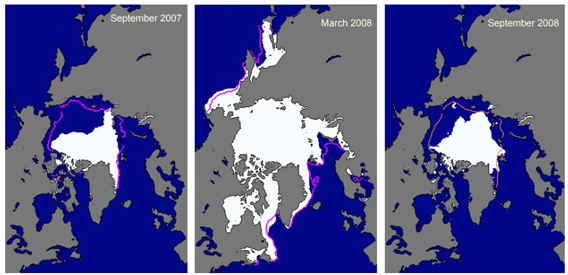NOAA offers “dramatic evidence” of Arctic warming
mongabay.com
October 16, 2008
Fall air temperatures 9°F (5°C) above normal, the second lowest-ever extent of summer sea ice, and the melting of surface ice in Greenland are signs of continued warming in the Arctic, according to the Arctic Report Card, an annual review of Arctic conditions by U.S. National Oceanic and Atmospheric Administration (NOAA) and its partners.
“Changes in the Arctic show a domino effect from multiple causes more clearly than in other regions,” said James Overland, an oceanographer at NOAA’s Pacific Marine Environmental Laboratory in Seattle and a lead author of the report. “It’s a sensitive system and often reflects changes in relatively fast and dramatic ways.”
 Sea ice extent in (left) September 2007, (center) March 2008 and (right) September 2008, illustrating the respective winter maximum and summer minimum extents. The magenta line indicates the median maximum and minimum extent of the ice cover, for the period 1979–2000. The September 2007 minimum extent marked a record minimum for the period 1979–2008. [Figures from the National Snow and Ice Data Center Sea Ice Index] |
Three of the six areas are coded red (atmosphere, sea ice, and Greenland) on the report card, “indicating that the changes are strongly attributed to warming”, while three (biology, ocean, land) are coded yellow, indicating mixed signals. The 2007 Report Card had two red areas (atmosphere and sea ice) and four yellow.
“The Arctic Report Card is one of the few opportunities for a team of researchers to work together to provide a very broad look at the state of the Arctic system,” said the report’s chief editor Jackie Richter-Menge from the USACE Cold Regions Research and Engineering Laboratory in Hanover, N.H. “The information combines to tell a story of widespread and, in some cases, dramatic effects of an overall warming of the Arctic system.”
NOAA: “There continues to be widespread and, in some cases, dramatic evidence of an overall warming of the Arctic system”:
- Atmosphere – 5° C temperature increases were recorded in autumn [red]
- Ocean – Observed increase in temperature of surface and deep ocean layers [red]
- Sea Ice – Near-record minimum summer sea ice extent [yellow]
- Greenland – Records set in both the duration and extent of summer surface melt [red]
- Biology – Fisheries and marine mammals impacted by loss of sea ice [yellow]
- Land – Permafrost temperatures tend to increase, while snow extent tends to decrease [yellow]